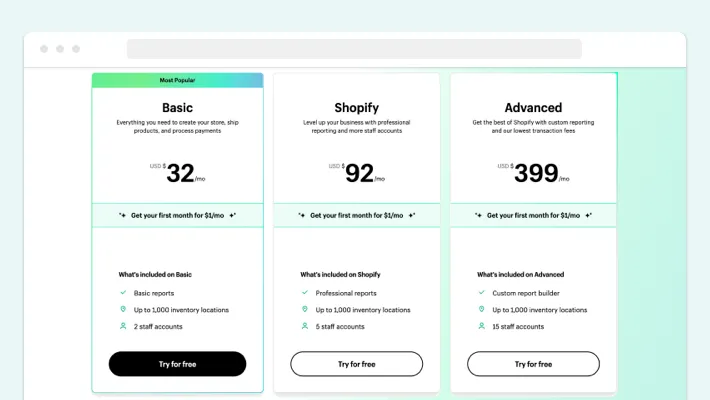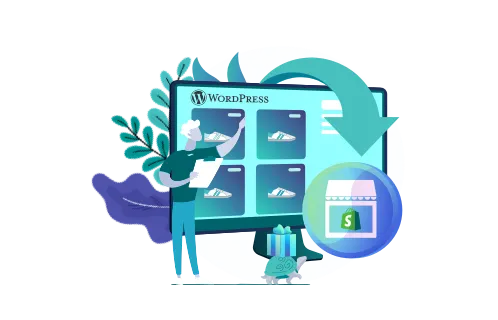In today’s all-digital world, online presence is vital for any business’s success. And robust website builders like Shopify or Squarespace are critical for achieving this goal.
With Shopify’s 4.4 million users and almost 3 million Squarespace customers, these two platforms have proven suitable for creating engaging, user-friendly websites that drive sales and establish a powerful online identity. But how do you choose the right option for your business needs?
This article will provide a detailed comparison of Shopify and Squarespace. We will explain their pros and cons, features, and pricing plans to make an informed decision. GenovaWebArt, in turn, will leverage its profound Shopify design and development experience to assist you in this journey.

Shopify or Squarespace: Key Features

The first thing you should know about a website-building platform is the features it provides. Let’s explore the distinctive characteristics of Shopify and Squarespace, shedding light on what sets them apart.
Shopify Features
Shopify is one of the best online store solutions offering numerous helpful features:
- Product management. Shopify empowers businesses to showcase and sell their products online efficiently. It’s possible thanks to multiple helpful features, from inventory tracking and order management to customizable product catalogs and variants.
- Point-of-sale (POS). For businesses with physical retail locations, Shopify offers a POS system. Seamlessly integrated with the online store, it enables accepting in-person payments and managing inventory across channels. Moreover, it provides a consistent and satisfying customer experience.
- Dropshipping. A standout feature of Shopify is its built-in dropshipping functionality. With these capabilities, businesses establish partnerships with suppliers, automate order fulfillment, and streamline the dropshipping process.
- Payment integrations. Shopify boasts over 100 payment integration options, offering customers a seamless checkout experience. Businesses can connect popular gateways, including PayPal, Stripe, and numerous other alternatives.
- Analytics and reports. Shopify offers analytics and reporting tools to gain insights into product sales, customer behavior, marketing efforts, and more.
Squarespace Features
Now, let’s look at the features peculiar to the Squarespace platform:
- Numerous template options. Squarespace offers an impressive selection of visually stunning and professionally designed templates. Thus, businesses choose templates that correspond to their brand identities.
- Design flexibility. Squarespace provides intuitive drag-and-drop tools and a convenient interface for extensive website customization.
- Domain options. With Squarespace, businesses can get rid of generic domain names. This platform offers enhanced flexibility, from registering new domains to seamlessly connecting existing ones.
- eCommerce integration. Although Squarespace isn’t a dedicated eCommerce solution, it offers an option to build an online store. Businesses often leverage this platform to demonstrate and sell products, process orders, manage inventory, and use other eCommerce-related tools.
Considering other e-commerce platforms for your business? Make sure you check out our BigCommerce vs Shopify comparison.
Squarespace or Shopify: Pros and Cons

If you’re wondering: “Is Shopify better than Squarespace?” or “How do I benefit from using Squarespace or Shopify?” – keep reading. We’ll now discuss both platforms’ pros and cons so you can choose the right fit for your business.
Shopify Pros
Let’s start with Shopify’s advantages. They are as follows:
- Ease of use. Shopify offers a user-friendly interface, intuitive tools, and a straightforward setup process. Therefore, it’s accessible to tech-savvy individuals and those lacking tech expertise.
- Decent customer support. Shopify delivers 24/7 assistance via phone, email, and live chat. As a result, businesses can promptly address their inquiries and resolve technical issues.
- Multiple payment options. Again, with a hundred secure payment gateway integrations, Shopify proves best for a seamless shopping experience.
- Different types of themes. Shopify Theme Store provides 12 free and 124 paid professional design templates catering to various industries and aesthetics.
- Plugins and apps. Shopify App Store has over 8,000 applications to enhance eCommerce websites. It includes marketing tools, inventory management solutions, social media integration, customer service plugins, and many more.
- Security. Shopify prioritizes the protection of customer data and transactions. The platform adheres to industry-standard security practices, including SSL encryption.
- Hosting. With Shopify, businesses don’t have to worry about finding separate hosting providers or managing server configurations. The platform handles all hosting aspects.
Shopify Cons
Now, let’s consider the drawbacks of Shopify you should be aware of.
- Pricing. While Shopify offers various pricing plans, it’s slightly more expensive than some alternatives.
- Limited customization. Shopify has particular limitations in fully customizing the online store’s appearance and functionality. So businesses seeking highly unique designs may face certain restrictions.
- No email hosting support. Unlike some other platforms, Shopify does not provide email hosting services. You may need separate email hosting providers, leading to additional costs and complexities.
Squarespace Pros
Let’s continue our review by delving into the benefits of Squarespace.
- Ease of use. Similar to Shopify, Squarespace has a convenient and user-friendly interface. Thus, the platform works well for tech-savvy and regular customers.
- No-code editing. Squarespace offers a no-code editing environment and drag-and-drop functionality, enabling businesses to customize their websites without any coding knowledge.
- Ready-to-use templates. The platform provides access to a vast collection of ready-made templates.
- Ease of customization. Squarespace aesthetic templates offer a solid starting point. But you can also customize and personalize your websites using the platform’s built-in design tools.
Squarespace Cons
Here are the most significant drawbacks of the Squarespace platform:
- Template customization limitations. Squarespace customization options are pretty limited. In particular, users may encounter constraints when creating highly unique or complex designs.
- Pricing. The website builder’s cost is a relative matter. Some businesses may find Squarespace too expensive, especially for higher scalability requirements.
- Limited features. Squarespace provides the essential tools to build and manage websites. But businesses with more advanced requirements, like extensive eCommerce functionality or complex integrations, may face limitations in the platform’s feature set.
Don’t forget to check our Magento vs Shopify comparison guide to explore these platforms’ pros and cons.
Shopify or Squarespace: Pricing
Are you still considering whether to choose Shopify or Squarespace for eCommerce website? Then, it’s worth paying attention to their pricing plans. Let’s compare the costs of launching your online store on both platforms.
Shopify offers four pricing plans to cater to different business needs. The options include:
- Shopify Basic. For $32 per month, you get an online store builder with basic reports and two staff accounts.
- Shopify. This plan, priced at $92 per month, provides a builder with professional reports and five staff accounts.
- Shopify Advanced. At $399 per month, you get a solution with custom reports and fifteen staff accounts.
- Shopify Plus. This plan starts at $2,000 per month. It’s suitable for enterprise-level online stores with complex functionality.

Squarespace provides the following pricing plans:
- Personal. This plan costs $16 monthly and gives access to customizable, high-quality templates.
- Business. With a $23 monthly plan, a company can expand its audience and start accepting payments.
- Commerce Basic. For $27 per month, this plan comes with selling tools to support business growth with no transaction fees.
- Commerce Advanced. At $49 per month, this plan provides all tools for advanced sellers without transaction fees.
Enterprise. This plan caters to corporate users at a negotiable price.

Which Platform Is Right for Your Business?
After a comprehensive exploration, it’s time to determine which platform is best for eCommerce, Squarespace or Shopify. Let’s once again go through the main points of our comparison.
- Features. Shopify stands out as a robust and feature-rich platform for eCommerce. It involves extensive product management tools, numerous integrations, and a dedicated point-of-sale system. On the other hand, Squarespace combines elegant website design with eCommerce capabilities. It’s suitable for businesses that prioritize aesthetics and prefer a user-friendly platform.
- Customization. Shopify offers multiple themes and extensive customization options to create unique online stores. However, it has some limitations in achieving highly custom designs. Squarespace, with its no-code editing and customizable templates, provides flexibility in design. But, similar to Shopify, it has certain restrictions to template customization.
- Pricing. Consider your budget and pricing preferences carefully when choosing between Squarespace eCommerce or Shopify. The first platform provides less expensive options, while the second requires more investment.
- Support and ease of use. Both platforms emphasize user-friendliness and provide customer support. Shopify is renowned for its round-the-clock support system. Squarespace, in turn, offers assistance through various channels.
- Business goals and scalability. Prioritize your objectives and future scalability requirements when making your choice. Shopify’s comprehensive eCommerce tools and scalability make it suitable for significant growth and expansion. In contrast, Squarespace is a good option for companies seeking an aesthetically pleasing online presence with moderate eCommerce needs.
All in all, your choice highly depends on your specific business requirements regarding functionality, pricing, customization, and scalability.
Conclusion
Choosing the right website-building platform is crucial for your online business’s success. We hope today’s detailed Shopify and Squarespace review helped you make your final decision.
And if you’ve chosen to launch an online store on Shopify, GenovaWebArt is here to assist you. We are a certified Shopify design and development agency with over ten years of experience. Our experts can make a difference in your project. Feel free to contact us for further help.



![8 Success Stories of Migrating to Shopify [Real Cases] - GenovaWebArt blog article, banner image 8 Success Stories of Migrating to Shopify [Real Cases] - GenovaWebArt blog article, banner image](https://genovawebart.com/hubfs/img/webp/hero-banner-blog-article-success-stories-of-migrating-to-shopify.webp)



